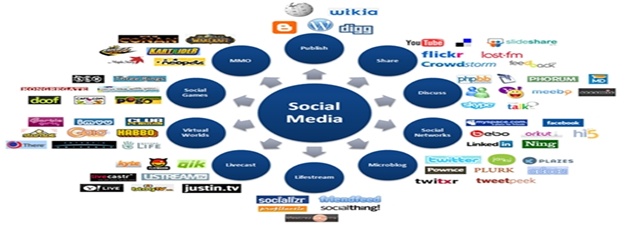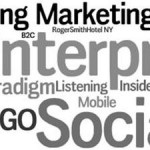Social media offers the latest roundup of online technologies based on the concept of community. Sharing opinions, posting comments, participating in discussion boards and simply exchanging media files are all facets of social media on the web today, and social bookmarking and networking are just a couple of these online activities. Knowing how to develop your business so that it is conducive to social media applications can help you interact with your customers in a variety of new ways and ultimately lead to the branding awareness you desire. Attractive websites that encourage user interaction are making the business of marketing much easier.
Social media sites encourage users to set up a profile and interact with other community members. Communities and niche channels develop organically, with limited effort from a company or site owner. By joining some of these networks as a business entity, you can create a valuable presence with a variety of customers and find out what they are most interested in.Submitting valuable articles and content, and then sharing it in a niche community, is an excellent way to create a positive presence in the world of social media, but there are some specific steps involved when publishing on the web.
But why is social media so important in your everyday business and marketing efforts? What role does it play in reaching your target market? These are both questions that many business owners and individuals will ask, and determining the effectiveness of social media will be a part of your Internet marketing strategy.
Social media is quickly becoming one of the web’s fastest growing online activities, a place for customers in a variety of markets and niche communities to learn, educate others, and interact with other buyers. As a result, it is in your best interest to track and gauge different patterns.Consider social media just one channel to accurately gauge your customers’ interests, tastes, and preferences. Each contributor is essentially volunteering testimonials on products, likes, dislikes, and other information that was once only available from direct market surveys or interviews. Social media platforms offer you some insight on what the customer truly wants at any given time.
Definition of Social Media
It is a kind of medium whereby user-generated information are shared within individuals and businesses. It allows them to interact and participate between users, on any topic that interest them, and engage in conversation to build bonding.
According to Wikipedia
Social media is information content created by people using highly accessible and scalable publishing technologies. It is intended to facilitate communications, influence interaction between peers and with public audiences. This is typically done via the Internet and mobile communications networks. The term most often refers to activities that integrate technology, telecommunications and social interaction, and the construction of words, pictures, videos and audio. This interaction, and the manner in which information is presented, depends on the varied perspectives and “building” of shared meaning among communities, as people share their stories and experiences. Businesses also refer to social media as user-generated content consumer-generated media (CGM). (UGC) or consumer-generated media (CGM).
Most Common Use of Social Media
- Social Bookmarking Sites: Del.icio.us, StumbleUpon, Stumpedia, Google Reader, CiteULike
- Blogging: Blogger, WordPress, LiveJournal, Vox, TypePad
- Micro-Blogging Sites: Twitter, Plurk, Jaiku
- Social News: Digg, Propeller, Reddit, Mixx
- Social Video: YouTube, Revver, MetaCafe, DailyMotion, Vimeo
- Social Photo: Flickr, Photobucket, WebShots, Zooomr, SmugMug
- Social Casting: Skype, Ustream.tv, Justin.tv











 Social media has become part of our lifestyle for most of the internet users today. There is no doubt that social media is the new web power. It has all the ingredients that can make the web the best thing that internet can ever present. The social media has enabled us to communicate effectively and […]
Social media has become part of our lifestyle for most of the internet users today. There is no doubt that social media is the new web power. It has all the ingredients that can make the web the best thing that internet can ever present. The social media has enabled us to communicate effectively and […] Are your business connected to the social media revolution? If you want to stay ahead of your competition and allow consumers to interact with your brand, social media is definitely the way to start. This is a long term marketing strategy as it takes time to build a community. If done correctly, social media helps […]
Are your business connected to the social media revolution? If you want to stay ahead of your competition and allow consumers to interact with your brand, social media is definitely the way to start. This is a long term marketing strategy as it takes time to build a community. If done correctly, social media helps […] Developing the product’s brand is perhaps the most challenging for business owners. The competition is always working toward the same goal: create a necessity product that is unique from others. Consumers often search for the cheapest, most effective or most popular product. So if you do not fall into any of these three categories, you […]
Developing the product’s brand is perhaps the most challenging for business owners. The competition is always working toward the same goal: create a necessity product that is unique from others. Consumers often search for the cheapest, most effective or most popular product. So if you do not fall into any of these three categories, you […] In this fast paced modern world, everybody is in search of those advertising channels which can provide fastest outcomes within short interval of time. This is the reason, why people are moving towards social networking on internet which is considered to be one of the most effectual ideas till now. Basically, social networking is meant […]
In this fast paced modern world, everybody is in search of those advertising channels which can provide fastest outcomes within short interval of time. This is the reason, why people are moving towards social networking on internet which is considered to be one of the most effectual ideas till now. Basically, social networking is meant […]